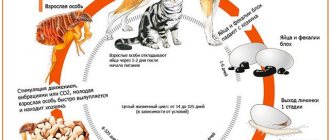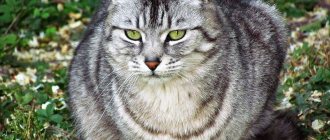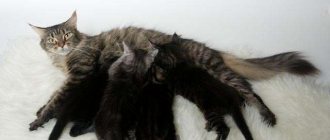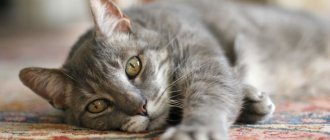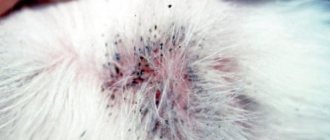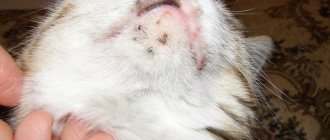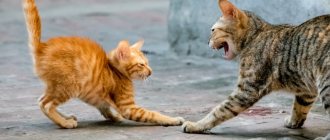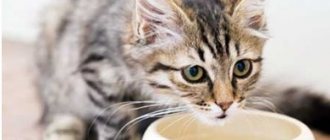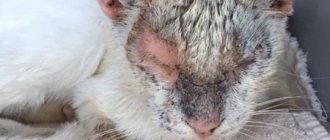Age: any
Symptoms: change in behavior, atypical aggression, refusal to eat, refusal of the animal to care for itself, reluctance to make contact, and others
We are accustomed to the fact that depression is a problem for people, but it turns out that our pets, in particular cats, can also suffer from this disease. Veterinary medicine encounters depression in cats quite often, although not all owners are aware of this problem. So what is it - depression in a cat ?
Remember the latest changes
If your cat is showing signs of depression, you need to think about what changes have happened in the house recently. Stability and a calm environment are very important for cats; any changes can upset the pet’s psychological balance.
Moving to another home, as well as separation from someone close (human or other animal) can be stressful and negatively affect the cat's condition.
Owners should also consider whether they are paying enough attention to their furry friend. Cats, despite their apparent independence, are mostly social animals. They need communication with their owners, care, affection and attention. In the absence of this, they may become depressed.
What can cause depression in a cat?
- Moving to a new place of residence. Cats are conservative creatures and often react negatively to changes in their lives. It takes them a long time to get used to new surroundings, new people, and smells. All this can disturb their peace and lead to depression.
- Disappearance of a loved one. Cats get used to a certain circle of people. They love some, they tolerate others, but if the composition of the family has changed, especially if the beloved owner is gone, the cat may experience severe anxiety. A similar condition occurs in dogs.
- Lack of attention. Domestic cats are very social. They need their owner's attention every day and if they don't receive it, they begin to get bored. This is especially evident in Siamese cats, which are more likely than others to become attached to people.
Signs and symptoms
Boredom and excessive sleepiness are not always a sign of depression. This happens to all pets from time to time. It is worth paying attention to the following symptoms:
- state of anhedonia. In simple words, the cat becomes indifferent to everything, it ceases to be pleased with what previously brought it pleasure: delicious food, treats, toys, etc.;
- sudden changes in behavior, actions become completely strange and illogical. An affectionate pet suddenly becomes aggressive, while a restless and active pet develops apathy;
- the animal stops performing actions previously familiar to it;
- sometimes cats begin to lick their fur too intensively, until wounds appear, or they stop going to the litter box;
- the pet becomes insecure, this manifests itself in the form of a desire to protect itself, its offspring, territory, bowl, etc. This may be accompanied by anger, apathy, and fear.
How to suspect depression in a cat?
- Behavior has changed. All cats have their own character, habits and habits, but if you notice that your pet’s behavior has changed significantly: he began to eat less or more, sleep, meow, this is a reason for concern.
- The cat has stopped grooming himself, his fur is dirty and looks sloppy. Or, on the contrary, the animal constantly licks itself nervously. All of these can be signs of depression.
- Noticeable hair loss, bald spots. Here it is necessary to differentiate the condition from seasonal molting.
- The cat began to defecate past the tray.
- Aggressive behavior: the cat began to bite, scratch, and hiss. All this indicates mental health problems in the animal.
- You should also suspect something is wrong if the cat suddenly begins to lead an overly solitary lifestyle: it often hides and is reluctant to make contact.
- Lethargy, apathy, decreased interest in the environment - all these are clear signs that the cat is bored.
Causes
Hormones
Often depression in cats is provoked not by external factors, but by hormonal changes associated with the functioning of the reproductive system. This can especially happen after sterilization or castration. It should be noted that after this operation, pets, even aggressive ones, become affectionate and calm, but depression may also occur, which can develop into depression.
Also, during sexual heat, cats may experience depression, which is a completely natural phenomenon. In this case, the owner just needs to be gentle and patient with his pet, there is no need for additional treatment, everything will go away on its own when the hormonal levels stabilize.
Postpartum
Cats may experience depression, also caused by a surge in hormones, during pregnancy and after giving birth.
Important!
This can be quite dangerous, because in a state of passion, a mother cat can attack the kittens or simply abandon them to their fate.
In addition, severe stress, and resulting depression, can occur if a cat has lost her newborn kittens.
Will or captivity?
Some experts believe that mental disorders in animals may appear due to the fact that they are cut off from their natural habitat.
Natural predators, who have it in their blood to hunt and fight for territory, lie at home on the couch and are bored, and because of this, their hormonal levels are disrupted.
This theory looks quite logical, but is still controversial and has many opponents. After all, the street is fraught with a lot of dangers for a pet - cars, dogs, knackers, the risk of contracting an infectious disease or picking up parasites.
And for a cat who is accustomed to a cozy home and a soft sofa, such a change of environment can cause even more stress.
How to treat depression in a cat?
First of all - attention. Offer your pet a game, pet it gently, and talk in a calm voice. The animal must feel safe and psychologically comfortable. Treat your cat to his favorite treat, arrange a comfortable place for sleep and privacy. In general, provide excellent care for your cat throughout. Eliminate all stressors as much as possible. Also, to normalize the condition, the doctor may prescribe general strengthening drugs and medications to correct the animal’s mental state. Medicines are selected on an individual basis.
Also, often in cases where the owner does not have the opportunity to provide the animal with proper care, but communication and attention, or if a sociable cat is too hyperactive for the owner, it is often recommended to get another animal so that the cat does not feel lonely when you are busy or absent. You shouldn’t be afraid that the animal will completely switch from you to its new playmate, but you should remember that everyone’s characters are individual and a lot depends on you, too. If the animal is very jealous, you still shouldn’t resort to such a solution - it can aggravate the situation. We should also not forget about the possibility that animals may not get along with their personalities, including among themselves.
The doctors at the Amis clinic are ready to provide your cat with qualified care. Come and we will select an effective course of treatment for your pet.
Treatment
If the factors that caused depression are known, they should first be eliminated or the cat distracted from them. To restore the nervous system, the pet needs a feeling of security and a calm environment.
Attention and care from the owners will be very helpful; physical activity and active games will be useful. It is important to show your cat that she is loved. To do this, you can pamper the cat with treats, comb out its fur, feed it from your hands, and communicate with it.
There are special synthetic pheromones that imitate natural ones and can have a relaxing effect.
If the measures taken by the owner do not help, the veterinarian prescribes medication - prescribes sedatives, psychotropic, and restorative medications. Treatment should only be selected by a doctor individually for each animal.
Attention!
Under no circumstances should you give your cat anti-depression medications prescribed to humans.
It is important to understand that depression can be dangerous for an animal. In especially severe cases, when the pet’s nervous system is not able to cope with stress on its own, functional disorders of the brain can occur, which can lead to death.
Fighting depression
During such periods, our pets are very vulnerable. Their condition cannot be left to chance. The owner must help the animal himself or contact a veterinarian.
- Give your cat enough attention . When the owner leaves for a long time, the animals perceive this painfully. They feel lonely and abandoned. If a cat comes up and nuzzles you, then it clearly requires communication. Play with the animal more often. He must run and frolic a lot;
- Try to leave something at home to entertain your cat while you are away. Do not curtain the windows so that the cat can watch the street. Place cat toys on the floor for your pet to run around with. Some owners leave the TV on so that the animals do not feel lonely;
- rule out the cause of depression if possible. If your cat is worried about changing the litter box, return him the old one. If he is afraid of rudeness, never raise your voice again;
- when it is not possible to exclude the cause of depression, you can try phobia therapy . This method must be used with caution. In dosage forms, accustom the animal to its fear. If he is afraid of the vacuum cleaner, turn it on for ten minutes every day. If your cat is afraid of walks, take him out for a short time every day. This will develop a habit and there is a chance that the pet will completely get rid of phobias.
The most important cure for depression is love. Protect your animals, give them care and understanding. Then they will enjoy every day and repay you with their friendship and good mood.
Diagnostics
Unfortunately, the cat cannot tell what is really bothering her. Therefore, it is important for owners to understand that symptoms that at first glance look similar to signs of depression may actually indicate the presence of a completely different disease, often quite serious.
We recommend reading: Why does an ex-husband sleep with his ex-wife?
How to help an animal
Experts advise paying more attention to your pet, brushing its fur more often, communicating with it, pampering it with treats, you can even feed it from your hands.
If you discover any incomprehensible symptoms, you should contact a veterinarian as soon as possible so as not to confuse the manifestations of depression with symptoms of a more serious disease, diagnose which only a specialist can do. If depression is confirmed, your pet's condition can be alleviated in the following ways:
- taking mild sedatives on a natural basis (only as prescribed by a veterinarian);
- changing the diet (there are foods created specifically for cats that often experience stress);
- eliminating all possible irritants (remove the collar, replace inconvenient bowls for water and food);
- unobtrusive behavior (do not stroke or pick up the animal against its will);
- providing freedom of movement and play.
The right approach, unobtrusive attention, warmth, affection and love for the pet are the key to the fact that over time its mental state will certainly normalize and the cat will again delight its owners with its usual behavior.
